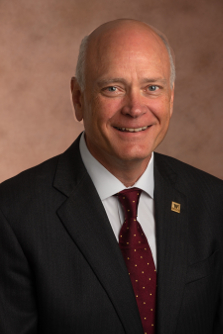
Over the past six months, the COVID-19 pandemic has transformed the daily lives of millions of people in the U.S., in Michigan, and in the community of Kalamazoo that we call home.
It has required us to take steps to keep ourselves and others safe, whether that be wearing a mask in public, practicing social distancing, or staying home when we are sick.
The pandemic, said Dr. Hal B. Jenson, the medical school’s founding dean, has given way to what he says is “a new social contract.”
“That social obligation that we have to one another is changing. The obligation we have to each other as colleagues in a learning and working environment is changing,” Dr. Jenson said recently. “It’s a new social contract, it’s different.”
With all of that in mind, recognizing the societal shift that COVID-19 has brought about, Dr. Jenson announced this month that all WMed employees and students will be required to receive the flu vaccination this year. In previous years, the medical school has required flu vaccinations only for patient care providers at WMed Health while also making the flu vaccination available free of charge to any employee who chose to get a flu shot.
Dr. Jenson said the new requirement will allow the medical school and the WMed community – students, residents, fellows, faculty, and staff – to play a role in preventing the spread of influenza in the midst of the ongoing COVID-19 pandemic. He said it is a small but important step by the institution that will, hopefully, help keep more hospital beds open for COVID-19 patients while also minimizing the chances of dual COVID-19—influenza infections.
“Our appreciation of some of these things and the steps we should take for each other—that recognition has changed,” Dr. Jenson said. “The principles have always been there but we haven’t always recognized them or acted fully on them. That’s the change that COVID-19 has prompted, a greater awareness of how we need to implement steps to ensure an even safer learning and working environment for everybody.”
The new requirement for members of the WMed community is among many steps medical school leaders have taken over the last several months because of the pandemic.
In March, leaders activated a Rapid Response Team to meet and regularly assess the impact of COVID-19 on the institution and ensure the safety of patients, employees, and students. That same month, a new policy was implemented to support employees working remotely from home and there was a quick transition to virtual learning, as well as virtual patient visits at WMed Health, and cancellation of all WMed-related travel.
Clinical rotations for students began again in June and students returned to the medical school’s W.E. Upjohn M.D. Campus in late July. Medical and graduate student curricula are being delivered in a hybrid manner using both in-person and virtual learning following strict guidelines for group size, social distancing, and other safety precautions.
Similar to the numerous steps and measures that have been implemented since March, Dr. Jenson said he is hopeful that the new flu vaccination requirement for all members of the WMed community will serve to enhance safety by minimizing the risk of transmission of influenza.
“Our focus is on a safe learning and working environment for all of our students and employees,” Dr. Jenson said. “The benefit of influenza vaccination will extend into the families of our learners and employees by minimizing the risk of passing influenza to older family members and children. We can protect those at high risk, we can do it for them.”
